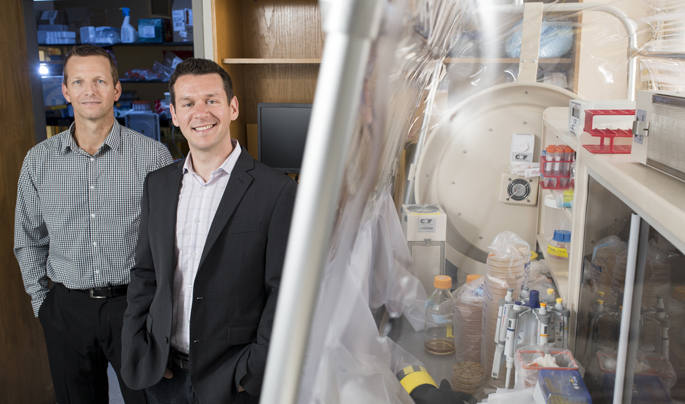Too much dietary zinc increases susceptibility to infection by Clostridium difficile — “C. diff” — the most common cause of hospital-acquired infections.

Credit: Vanderbilt University
The findings, reported Sept. 26 in Nature Medicine, call into question the consumption of dietary supplements and cold therapies containing high concentrations of zinc.
“It is important to know what you are putting into your body,” said Eric Skaar, Ph.D., MPH, professor of Pathology, Microbiology and Immunology at Vanderbilt University. “Multivitamins and other supplements are really only needed by those with a particular nutritional deficit in their diet.”
Skaar and his colleagues including Joseph Zackular, Ph.D., discovered that high levels of zinc change the gut’s microbiome — the community of microbial organisms — in a way that mimics antibiotic treatment, the primary risk factor for C. diff infection.
In addition to raising concerns about multivitamin consumption, the findings have particular importance for patients who are hospitalized or taking antibiotics and who are also receiving zinc-supplemented nutrition, which may put them at even greater risk for C. diff infection.
“We need to consider how much zinc these patients have in their diet — and maybe other trace nutrients that might also have an effect on the microbiome,” said Skaar, who is also the Ernest W. Goodpasture Professor of Pathology.
The findings may also partially explain the increasing rates of C. diff infection in people who haven’t been hospitalized or treated with antibiotics, Skaar said. In the United States, C. diff infects about a half million people each year, causing disease ranging from diarrhea to life-threatening inflammation of the colon (colitis), according to the Centers for Disease Control and Prevention.
Skaar and his colleagues used mouse models to explore the impact of dietary metals on susceptibility to infectious diseases.
They demonstrated that mice consuming a high-zinc diet had altered gut microbiota and were susceptible to C. diff infection at lower antibiotic doses compared to mice on a normal zinc diet. Moreover, C. diff caused more severe disease and lethality in mice on a high-zinc diet.
“Antibiotics make someone susceptible to C. diff by killing many of the healthy organisms in the gut and decreasing microbial diversity, which allows C. diff to take hold,” Skaar said. “A high zinc diet changes the structure of the microbial community in a similar way and reduces the threshold of antibiotics that are needed to convert a resistant microbial community to one that is sensitive to C. diff.”
The investigators also showed that the zinc-binding protein calprotectin is important for combating C. diff by limiting zinc availability during infection. The findings add to growing evidence that the microbiome is dramatically affected by diet, and suggest that efforts to treat C. diff infections with an “ideal” mix of microbes will be difficult.
Fecal transplants — transfer of stool from a healthy donor to the gastrointestinal tract of a patient with C. diff — have been effective for treating recurrent C. diff colitis, prompting attempts to treat C. diff with a small number of microbes. But the first clinical trial of a “reduced microbial transplant” for C. diff recently failed.
“Everyone’s microbiome is unique, and each microbiome is differentially affected by environmental factors, such as diet,” Skaar said. “There’s a lot we still need to learn about the factors that shape our microbiome, so that we can design successful therapeutic strategies that target this important community of microbes.”
The findings also have implications for the agriculture industry, which uses zinc supplementation to grow bigger animals, Skaar noted.
“It’s possible that zinc supplementation of livestock is leading to animals that are more susceptible to colonization with C. diff, and that might be a way that C. diff is then passed to people,” Skaar said.
Web Source: Vanderbilt University Medical Center.
Reference:
Joseph P Zackular, Jessica L Moore, Ashley T Jordan, Lillian J Juttukonda, Michael J Noto, Maribeth R Nicholson, Jonathan D Crews, Matthew W Semler, Yaofang Zhang, Lorraine B Ware, M Kay Washington, Walter J Chazin, Richard M Caprioli, Eric P Skaar. Dietary zinc alters the microbiota and decreases resistance to Clostridium difficile infection. Nature Medicine, 2016; DOI: 10.1038/nm.4174
The post Excess dietary zinc worsens C. diff infection appeared first on Scienmag.





